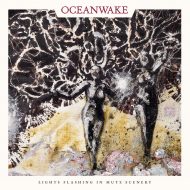 If you’re bored and want to amuse yourself in a slightly different way, try the following: Type “The world’s most confusing graphs” into your search engine and have a good look at what comes up. It’s mind-boggling, I’m telling you. From one graph to another, you will see, how people try to put complex concepts to paper and fail at it, only stating the obvious, or making everything more confusing instead of clarifying things. There is even a book that deals solely with this phenomenon (by a German, Gerhard Henschel, Die wirrsten Grafiken der Welt). The line between complexity and abstruseness is very thin. Why am I telling you all of this? Because the band Oceanwake from Luvia, Finland, make music on that thin line.
If you’re bored and want to amuse yourself in a slightly different way, try the following: Type “The world’s most confusing graphs” into your search engine and have a good look at what comes up. It’s mind-boggling, I’m telling you. From one graph to another, you will see, how people try to put complex concepts to paper and fail at it, only stating the obvious, or making everything more confusing instead of clarifying things. There is even a book that deals solely with this phenomenon (by a German, Gerhard Henschel, Die wirrsten Grafiken der Welt). The line between complexity and abstruseness is very thin. Why am I telling you all of this? Because the band Oceanwake from Luvia, Finland, make music on that thin line.
Oceanwake were founded in 2009 and play – well, that’s the thing right there. I can’t say what exactly they play. A bit of everything and nothing in particular. Doom, post-metal, black metal, progressive metal, with clean singing, with throat singing, experimental, atmospheric, tribal – you name it, and I’ll find you a track, or bits of a track, that fits your chosen genre or adjective. The influences the band list are correspondingly broad and varied, ranging from Emperor, Cult of Luna, Isis, The Ocean, and Paradise Lost to Pink Floyd and Black Sabbath.
It’s not bad, of course, if music doesn’t fit a genre. On the contrary. It can be an indicator of innovativeness. As long as the music or the concept show a direction or some kind of governing principle. What’s the governing principle here? The direction? The purpose? I’m not sure. It’s really difficult to say. To be fair, the blurb does warn the potential listener already in the first sentence that this is not “smooth entertainment” and does not provide a “fast access”. It goes on saying that “it is important to remain attentive and pay attention to all signs, and sounds.” Be assured that I have done so, but I’m still none the wiser for it.
Let’s start with the album cover. The first thing that came to my mind when I looked at it was the photo of the Napalm girl. The woman in the centre of the cover art has an almost identical body posture. The background of the painting could also well be interpreted as representing fire and smoke, with some explosions still going on. Besides the first woman, there is another one to her right, both are red-eyed and either screaming or laughing hysterically, running into something what looks like the sea.
So, has this got an anti-war theme? No, I don’t think so. Apart from the similarities to the photo of the Napalm girl there is nothing that would suggest an anti-war theme. The album title, however, might indeed hint towards photography, since a photograph is definitely a mute scenery.
How about the track titles, do they get you any further in finding out what this is about? No. The references are many and as diverse as everything else. Titanomachia, the title to the fifth track, offers the most solid reference. It is the name of a lost Greek epos about the War of the Titans or The Battle of the Gods. Apart from this, everything is very broad and vague. You can’t derive much from Posthuma, The Occult or Travelouge, and even less from everything taken together.
The music, as mentioned above, is a smorgasbord. The first track Radiant Nightbreak, for example, goes from Pink Floyd to doom to blackened post metal, with both, clean and growly vocals. The album’s atmosphere is similarly wide-ranging. There are no happy tunes, but apart from that you can hear pretty much everything: melancholia, sadness, contemplativeness, dangerousness, but also contentedness, and even an investigative optimism, for example in the tribal or African percussion work on Travelouge.
Despite its weird and mismatched sound, Travelouge is my favourite track on the album. African percussion and electric guitar are not the most natural pair. It works, however, especially in combination with the dreamy, clean vocals. The atmosphere later changes somewhat with another guitar and growly vocals being added, but compared to the albums other tracks Travelouge is pretty consistent and a bit less of a hodgepodge. Currents is another track I like and a better example for the band’s intricate sound.
And now to the final question: Do I recommend the album? Do I like it? Yes and no. I’m somewhat annoyed by it. If the album was a person, I’d ask it to get to the point. There are some really good pieces of music on the album, but often the band crosses the line between complexity and abstruseness, wading in the latter.
(7/10 Slavica)
https://www.facebook.com/OceanwakeFi
https://oceanwakelfr.bandcamp.com/album/lights-flashing-in-mute-scenery

Leave a Reply